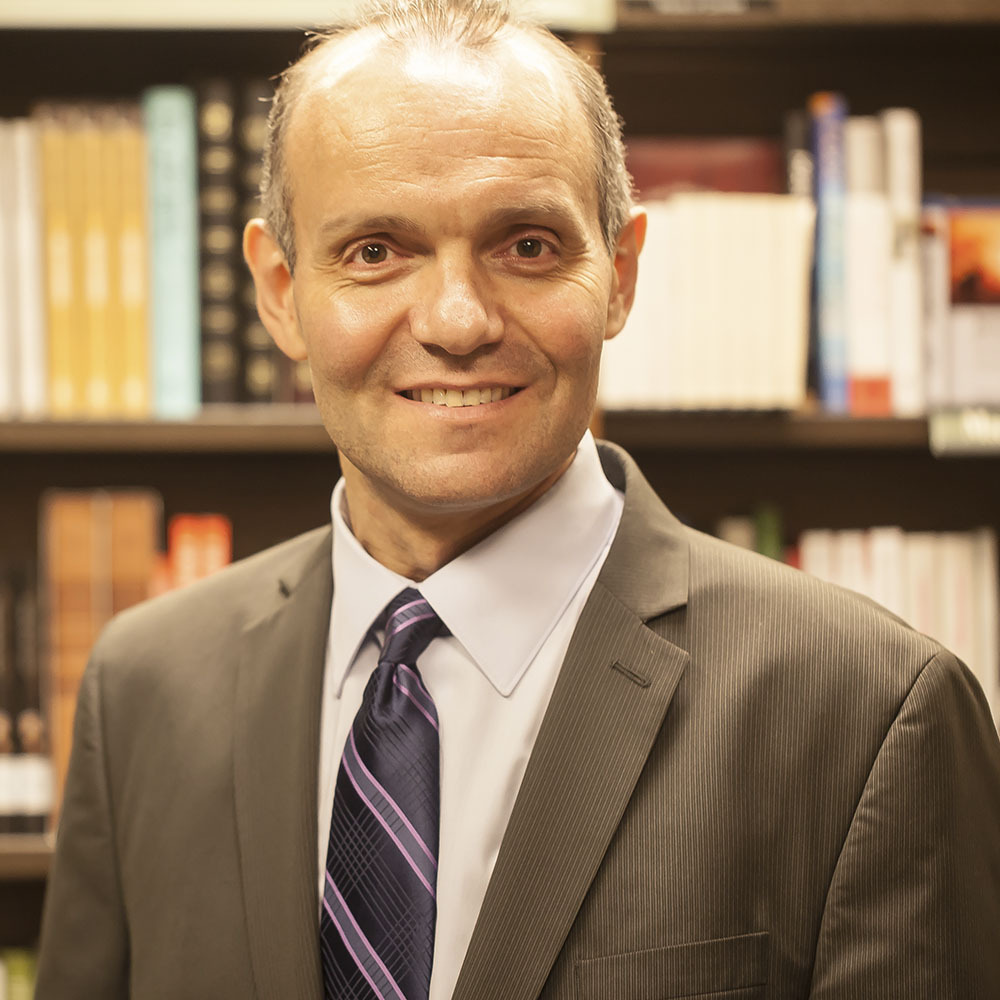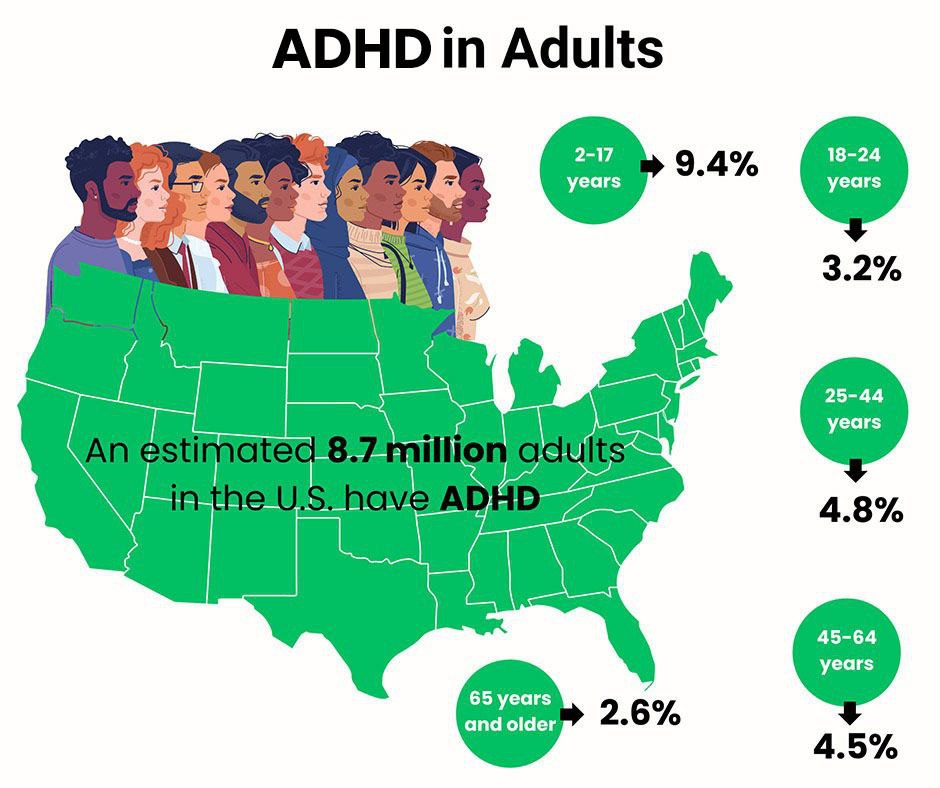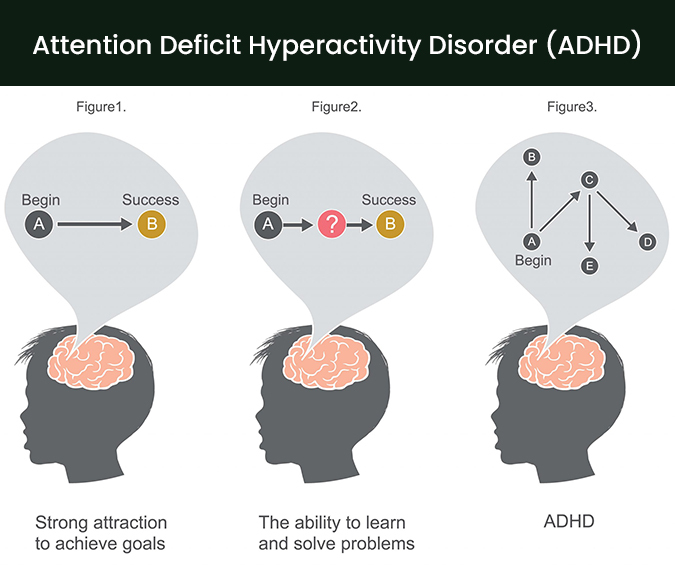Table of contents
Dr. Zlatin Ivanov at Online Psychiatrists specializes in ADHD treatment and therapy in New York. As a trusted virtual psychiatrist, he provides only evidence-based, effective approaches, including medication management, Cognitive Behavioral Therapy (CBT), and Organizational Skills Training (OST). Get a personalized ADHD treatment plan from Dr. Ivanov in person or online. Online Psychiatrists has offices in Midtown Manhattan (Chrysler Building, 405 Lexington Ave, New York, NY) and Miami, FL (701 Brickell Avenue).
Harvard Certified
Nationally Recognized
Book AppointmentWhat is ADHD?

Attention-deficit/hyperactivity disorder (ADHD), also known as attention deficit disorder, distractibility, and inattention deficit disorder, is a common behavioral disorder characterized by persistent inattention, hyperactivity, and impulsivity.
According to 2022 national parent survey data, about 7 million U.S. children ages 3-17 (11.4%) have been diagnosed with ADHD at some point.
ADHD is usually diagnosed in childhood, but it can often last into adulthood, affecting areas of the brain that prevent you from concentrating, planning, and understanding the behavior of others. People with ADHD are usually impulsive and often overly active.
Depending on the symptoms, there are three types of ADHD:
- Predominantly hyperactive (hyperactivity syndrome without attention deficit)
- Predominantly inattentive (attention deficit disorder without hyperactivity) - ADD
- Combined (attention deficit hyperactivity disorder)
Attention deficit hyperactivity disorder tends to be inherited.
"ADHD is not a 'disorder'. The only difference is in how your brain learns and processes information." - says Dr. Zlatin Ivanov, Top Rated ADHD Psychiatrist.

Causes and Symptoms of ADHD
The exact cause of attention deficit hyperactivity disorder is not known, but it is associated with various factors such as genetics, environment, and developmental factors.
Neurobiological Aspects
Research shows that ADHD is linked to measurable differences in brain structure and function. Some regions—such as parts of the prefrontal cortex, basal ganglia, and cerebellum—tend to be slightly smaller or develop more slowly in people with ADHD. There is also evidence of neurotransmitter dysregulation, particularly involving dopamine and norepinephrine. These chemical messengers help regulate attention, impulse control, and motivation, and disruptions in their activity can contribute to core ADHD symptoms.
While genetics play a major role, certain environmental influences may increase risk. These include prenatal exposure to nicotine, alcohol, or certain toxins; premature birth or low birth weight; and early childhood exposure to lead or significant stress. None of these factors cause ADHD on their own, but they can interact with genetic vulnerability to influence how symptoms develop.
ADHD Myths Debunked
- Sugar causes ADHD: Research shows sugar does not cause the disorder, though high sugar intake may briefly affect energy and focus.
- Too much screen time leads to ADHD: Excessive screen use can worsen attention problems, but it is not a root cause.
- Poor parenting creates ADHD: Parenting style does not cause ADHD. However, consistent structure, positive reinforcement, and supportive routines can help manage symptoms.
"ADHD is not some terrible pathology that is visible from the earliest development. It's just a minimal brain dysfunction that causes the brain to work in a specific way." - says Dr. Zlatin Ivanov, Psychiatrist.
Most often, the disease appears before the age of 4, but the age at which a definitive diagnosis can be made is 8-10 years. In some cases (e.g., with a symptom of lack of attention without hyperactivity), the syndrome can be diagnosed only in adolescence.
The main symptoms of ADHD:
- Inattention
- Impulsivity
- Hyperactivity
Often, ADHD is manifested by anxiety, irritability, depression or apathy, and severe behavioral disorders. One common but often overlooked symptom is ADHD Paralysis - a state of mental "freezing" when faced with decisions or tasks, making it difficult to start or complete activities.

How is ADHD Diagnosed?
If you think you might have ADHD, the first thing to do is talk to someone who really understands it. In New York, that usually means a psychiatrist, psychologist, or clinical social worker who works with adults.
The first appointment is mostly a conversation. You’ll go over the challenges you face in daily life — at work, at home, or in school. Your provider will also ask about your childhood and review your medical history. This helps rule out other conditions that might look like ADHD. Many offices now offer telehealth, which is a big help if getting to an office is tricky.
ADHD isn’t diagnosed with a single test. A proper evaluation usually includes a few steps. There’s a medical check to make sure nothing else — like sleep problems, thyroid issues, or substance use — is causing your symptoms. Then comes a history review, looking at patterns in school, work, and mental health over the years. Finally, you might fill out questionnaires that compare your behavior to typical adult ADHD symptoms.
Clinicians rely on the DSM-5 criteria, which divide ADHD symptoms into two categories: inattentive and hyperactive-impulsive. Adults usually need at least five symptoms in one category to meet the criteria.
Inattentive symptoms:
- Makes careless mistakes or misses details
- Has trouble staying focused
- Seems not to listen
- Starts tasks but struggles to finish them
- Finds it hard to organize
- Avoids tasks that require long focus
- Often loses things
- Easily distracted
- Forgetful in everyday life
Hyperactive-Impulsive symptoms:
- Fidgets or can’t sit still
- Leaves their seat when expected to stay seated
- Feels restless
- Talks a lot
- Blurts out answers or interrupts
- Can’t wait for a turn
- Intrudes on others
Providers often use tools like the Adult ADHD Self-Report Scale (ASRS) or Conners’ Adult ADHD Rating Scales to get a clearer picture.
Here’s something important: brain scans cannot diagnose ADHD. The condition is identified through history, symptoms, and behavior — not imaging.
After the evaluation, your provider will explain the results and discuss next steps. This could be therapy, medication, practical strategies, or a combination. The goal is to find what actually helps you manage symptoms and navigate daily life more easily.
What Are the Most Effective ADHD Treatments in New York City?
Attention deficit hyperactivity disorder treatment usually involves a combination of prescribed medication, psychological therapy, and the development of symptom management skills. That is why each patient needs to be closely monitored to find an effective ADHD treatment.
We offer a variety of ADHD treatment options for adults in New York City that include:
- Cognitive Behavioral Therapy
- Group therapy
- Family therapy
- Interpersonal therapy
- ADHD Medication
- Telepsychiatry
The best treatment option for ADHD is a comprehensive one - psychological correction in combination with medications. Dr. Ivanov has extensive experience treating a wide range of mental health issues provided in various formats, including online consultations, to make sure you feel as comfortable as possible on your journey to positive change in your life.
Harvard Certified
Nationally Recognized
Book AppointmentADHD Medication: Types, Benefits, and Side Effects
If you’re looking into adhd medication in nyc, it helps to understand the main options, how they work, and what side effects to watch for.
Doctors typically prescribe three broad categories of ADHD medicine. Each has its own way of helping the brain manage attention and impulse control. These include:
Stimulants
These are the most common. Drugs such as Ritalin and Concerta (methylphenidate) or Adderall and Vyvanse (amphetamines) raise the levels of dopamine and norepinephrine—chemicals that support focus and self-control. Stimulants come in two styles: short-acting, which wear off after about three to four hours, and long-acting, which can last most of the day.
Non-stimulants
When stimulants aren’t a good fit, doctors may turn to medications like Strattera (atomoxetine), Qelbree (viloxazine), Intuniv (guanfacine), or Kapvay (clonidine). These target norepinephrine or calm certain brain signals and usually take a few weeks before you feel the full effect.
Certain Antidepressants
Drugs such as bupropion (Wellbutrin) or some older tricyclic antidepressants can be useful when ADHD is paired with depression or when other treatments haven’t worked. They also influence dopamine and norepinephrine, but in a gentler way.
Short-Acting vs. Long-Acting
Some medicines start working fast but wear off within a few hours, which means more than one dose a day. Others release slowly and last eight to twelve hours, making once-a-day dosing possible and often reducing the “ups and downs.”
What Patients Notice When It Helps
- Staying focused for longer stretches
- Fewer impulsive actions
- Better follow-through on plans and tasks
- Smoother routines at work, school, or home
- Often more effective when combined with therapy or coaching
Possible Side Effects
Side effects depend on the drug and the dose, so regular check-ins with your doctor are important. Some of the most common side effects include:
- Stimulants: loss of appetite, weight loss, trouble sleeping, increased heart rate or blood pressure, jitteriness. In rare cases, heart rhythm issues or mood swings. They also carry a risk of misuse, so careful monitoring is key.
- Non-stimulants: drowsiness, stomach upset, slight blood pressure changes, or mood shifts. Atomoxetine has a rare risk of liver problems.
- Antidepressants: dry mouth, dizziness, stomach upset, sleep problems, or sexual side effects, depending on the medication.
Because stimulants are controlled substances, doctors watch for any sign of misuse. Regular visits help track blood pressure, heart rate, sleep, and mood, and allow for dose changes if needed. The goal is to find the lowest dose that manages symptoms without causing problems.
Patients Talk About Their ADHD Treatment Experience
After struggling with ADHD for years, I was hesitant to start treatment. But working with Dr. Zlatin from Online Psychiatrists was a game-changer. He took the time to explain the condition to me and crafted a treatment plan that works for my unique needs. The virtual visits were convenient and easy to use, and the ADHD medication management has truly transformed my life.
Google Reviews ★★★★★The level of care and support I received here has been instrumental in my treatment journey. They provide effective telepsychiatry that leads to successful outcomes in dealing with specific conditions. Whether it's ADHD or depression, Dr. Ivanov’s approach is tailored. I’ve been a client here for about 7 months, and I'm grateful for his expertise, understanding, and commitment to improving mental health through virtual visits. THANK YOU
Google Reviews ★★★★★Finding a reliable and caring psychiatrist can be challenging, but Online Psychiatrists made the process incredibly smooth. I sought help for my ADHD, and I was connected with a highly skilled professional who specializes in ADHD treatment. The virtual appointments allowed me to receive the care I needed from the comfort of my own home. The psychiatrist listened attentively to my concerns, provided valuable insights, and worked with me to develop a personalized treatment plan. This plan works ideally for me.
Google Reviews ★★★★★I've had attention deficit since childhood. But it wasn't until I started the virtual sessions that I truly felt seen and understood. The convenience of connecting with a Manhattan psychiatrist from my own home has been life-changing. So far so good...
Google ReviewsThe Impact of Untreated Adult ADHD
Leaving ADHD untreated in adulthood can ripple through almost every part of daily life, including:
- Work and Career – Missed deadlines, job changes that happen too often, or ongoing performance struggles can make it hard to move forward professionally.
- Relationships – Forgetting plans, speaking without thinking, or having trouble listening can strain friendships, romantic partners, and family ties.
- Emotional Health – Constant stress and frustration take a toll. Many adults describe feeling worn down, discouraged, or anxious when symptoms go unchecked.
- Money Matters – Disorganization and impulsive spending can lead to unpaid bills or ongoing financial trouble.
- Risk of Substance Use – Some people turn to alcohol, nicotine, or other substances in an effort to calm their mind or stay focused, which can create bigger problems over time.
Getting a proper evaluation and starting treatment early can make a noticeable difference — helping to steady work life, improve relationships, and protect overall well-being.
How Can Online Psychotherapy Help With ADHD?
Online ADHD treatment can be a practical part of a treatment plan because it allows you to receive virtual counseling from the comfort of your own home. This is incredibly convenient for people who find it challenging to visit doctors due to concentration problems or hyperactivity.
Perhaps you are a parent looking for ADHD treatment for children or information that will facilitate daily care for your child. In this case, our online ADHD psychiatrist can be your coach in creating and following a daily routine.
Although online consultations are very convenient, it is essential to consult an experienced ADHD doctor before starting any new treatment plan.
Frequently Asked Questions
What Therapy Is Best for Adult ADHD?
For adults with ADHD, cognitive behavioral therapy (CBT) is recommended to combat negative thinking patterns and develop practical skills. ADHD coaching that focuses on organization, time management, and goal setting can also be helpful. Therapy should be tailored to the individual, so it is important to discuss options with a mental health professional.
What Is the Current Treatment for Adult ADHD?
The treatment of ADHD in adults usually involves a combination of medication and therapy. Medications such as stimulants (e.g., Adderall, Ritalin) and non-stimulants (e.g., Strattera) help to control symptoms. Therapeutic options such as cognitive behavioral therapy (CBT) and ADHD coaching support behavioral changes and coping strategies. In addition, lifestyle changes, such as better organization and stress management, can complement treatment.
Can ADHD Get Worse With Age?
ADHD symptoms can change with age but do not necessarily worsen. For some adults, symptoms can be better managed with appropriate treatment and coping strategies. For others, however, difficulties may increase due to life demands, stress, or untreated symptoms. It is important that people with ADHD continue to work with healthcare professionals to adjust their treatment plans as needed.
Related Articles
- What Is ADHD Paralysis – Do I Have It?
- How To Get Prescribed Adderall For ADHD Online
- Identifying and Treating the Seven Types of ADD/ADHD
- 5 Most Common Behavioral Issues
- What Happens During a Psych Evaluation?
As your ADHD doctor at Online Psychiatrists, Dr. Zlatin Ivanov helps you find the correct combination of ADHD treatment options for your stage of life or family dynamics. Helping you increase your focus helps you better navigate your daily life. Contact our psychiatry practice today for a consultation.
